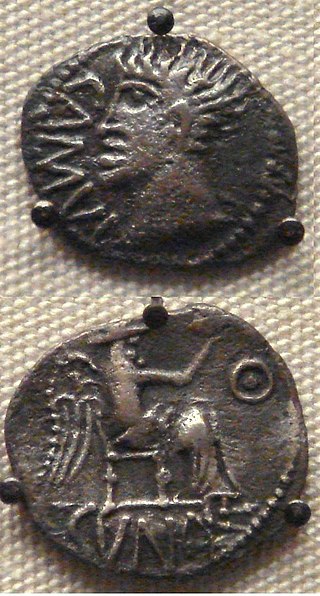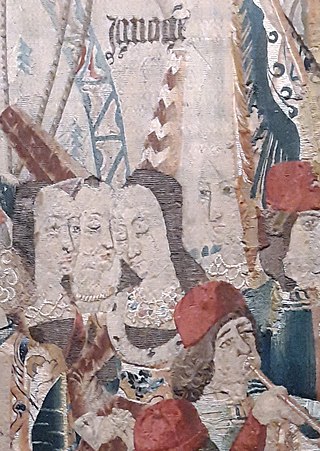Related Research Articles

Geoffrey of Monmouth was a Catholic cleric from Monmouth, Wales, and one of the major figures in the development of British historiography and the popularity of tales of King Arthur. He is best known for his chronicle The History of the Kings of Britain which was widely popular in its day, being translated into other languages from its original Latin. It was given historical credence well into the 16th century, but is now considered historically unreliable.

Uther Pendragon (Brittonic), also known as King Uther, was a legendary King of the Britons and father of King Arthur.

Coel, also called Coel Hen and King Cole, is a figure prominent in Welsh literature and legend since the Middle Ages. Early Welsh tradition knew of a Coel Hen, a c. 4th-century leader in Roman or Sub-Roman Britain and the progenitor of several kingly lines in Yr Hen Ogledd, a region of the Brittonic-speaking area of what is now northern England and southern Scotland.

Beli Mawr was an ancestor figure in Middle Welsh literature and genealogies. He is the father of Cassivellaunus, Arianrhod, Lludd Llaw Eraint, Llefelys, and Afallach. In certain medieval genealogies, he is listed as the son or husband of Anna, cousin of Mary, mother of Jesus. According to the Welsh Triads, Beli and Dôn were the parents of Arianrhod, but the mother of Beli's other children—and the father of Dôn's other children—is not mentioned in the medieval Welsh literature. Several royal lines in medieval Wales traced their ancestry to Beli. The Mabinogi names Penarddun as a daughter of Beli Mawr, but the genealogy is confused; it is possible she was meant to be his sister rather than daughter.

Cunobeline or Cunobelin, also known by his name's Latin form Cunobelinus, was a king in pre-Roman Britain from about AD 9 to about AD 40. He is mentioned in passing by the classical historians Suetonius and Dio Cassius, and many coins bearing his inscription have been found. He controlled a substantial portion of south-eastern Britain, including the territories of the Catuvellauni and the Trinovantes, and is called "King of the Britons" by Suetonius. Cunobeline may have been a client king of Rome, based on the images and legends appearing on his coins. Cunobeline appears in British legend as Cynfelyn (Welsh), Kymbelinus or Cymbeline, as in the play by William Shakespeare.

King Lot, also spelled Loth or Lott, is a British monarch in Arthurian legend. He was introduced in Geoffrey of Monmouth's pseudohistorical Historia Regum Britanniae as King Arthur's brother-in-law, who serves as regent of Britain between the reigns of Uther Pendragon and Arthur. He has appeared regularly in works of chivalric romance, alternating between the roles of Arthur's enemy and ally, and is often depicted as the ruler of Lothian and either Norway or Orkney. His literary character is probably derived from hagiographical material concerning Saint Kentigern, which features Leudonus as king of Leudonia and father of Saint Teneu.

Tasciovanus was a historical king of the Catuvellauni tribe before the Roman conquest of Britain.
Gwendolen, also known as Gwendolin, or Gwendolyn was a legendary ruler of ancient Britain. She came to power in 1115BC.

Historia regum Britanniae, originally called De gestis Britonum, is a pseudohistorical account of British history, written around 1136 by Geoffrey of Monmouth. It chronicles the lives of the kings of the Britons over the course of two thousand years, beginning with the Trojans founding the British nation and continuing until the Anglo-Saxons assumed control of much of Britain around the 7th century. It is one of the central pieces of the Matter of Britain.
Arvirargus or Arviragus was a legendary British king of the 1st century AD, possibly based upon a real person. A shadowy historical Arviragus is known only from a cryptic reference in a satirical poem by Juvenal, in which a giant turbot presented to the Roman emperor Domitian is said to be an omen that "you will capture some king, or Arviragus will fall from his British chariot-pole".
Marius was a legendary king of the Britons during the time of the Roman occupation of Britain, as recounted in Geoffrey of Monmouth's pseudohistorical Historia Regum Britanniae. He came to power in 96AD. He was the son of King Arvirargus and ruled following his father's death.
Trahern is a legendary King of the Britons in Geoffrey of Monmouth's fictional Historia Regum Britanniae.

Dionotus was a legendary king of Cornwall in Geoffrey of Monmouth's Historia regum Britanniae, an account of the rulers of Britain based on ancient Welsh sources and disputed by many historians. Dionotus succeeding his brother Caradocus, and was regent of Britain during the campaigns in Gaul of Emperor Magnus Maximus. The curious thing about this king is that the Welsh chronicles, which parallel most of Geoffrey of Monmouth's book, do not mention this king by name. However, Geoffrey uses Latin versions of Welsh names so he could be referring to Dynod, duke of Cornwall, or Anwn Dynod, Maximus's own son.
Gracianus Municeps was a legendary King of the Britons, according to Geoffrey of Monmouth's Historia regum Britanniae, a largely fictional account of British history. "Municeps" translates to "freedman", meaning this individual was Gracianus the freedman. After the death of Roman Emperor Magnus Maximus, Gracianus seized the throne of Britain upon receiving word of Maximus's demise, by whose orders he had been sent to defend the attacked island while Maximus was campaigning on the continent.

Conan Meriadoc is a legendary British Celtic leader credited with founding Brittany. Versions of his story circulated in both Brittany and Great Britain from at least the early 12th century, and supplanted earlier legends of Brittany's foundation. His story is known in two major versions, which appear in the Welsh text known as The Dream of Macsen Wledig, and in Geoffrey of Monmouth's Historia Regum Britanniae. Both texts associate him with Magnus Maximus, a Roman usurper against the Valentinianic dynasty who was widely regarded as having deprived Britain of its defences when he took its legions to claim the imperial throne. Conan's cousin or sister, Saint Elen, is said to have been Macsen Wledic's wife.
Lucius Tiberius is a Western Roman procurator or emperor from Arthurian legend in which he is killed in a war against King Arthur. First appearing in Geoffrey of Monmouth's pseudo-historical work Historia Regum Britanniae, Lucius also features in later, particularly English literature such as the Alliterative Morte Arthure and Thomas Malory's Le Morte d'Arthur. The motif of a Roman Emperor defeated by Arthur is found in the Old French literature as well, notably in the Vulgate Cycle.

Innogen is a character in the Historia Regum Britanniae and subsequent medieval British pseudo-history. She was said to have been a Greek princess, the daughter of King Pandrasus, and to have become Britain's first Queen consort as the wife of Brutus of Troy, the purported first king of Britain who was said to have lived around the 12th century BC. Her sons Locrinus, Camber, and Albanactus went on to rule Loegria, Cambria, and Alba respectively.
Guiderius is a legendary British king according to Geoffrey of Monmouth's Historia Regum Britanniae and related texts. He can probably be identified as deriving from the historical Togodumnus.

Rowena in the Matter of Britain was the daughter of the purported Anglo-Saxon chief Hengist and wife of Vortigern, "King of the Britons". Presented as a beautiful femme fatale, she won her people the Kingdom of Kent through her treacherous seduction of Vortigern. Contemporary sources are nearly non-existent, so it is impossible to know if she actually existed.
References
- ↑ Hall, Mathew (1854). Lives of the Queens of England Before the Norman Conquest. History of women. Harvard University: Blanchard and Lea. pp. 74.
- ↑ Geoffrey of Monmouth, Historia Regum Britanniae 4.15-16